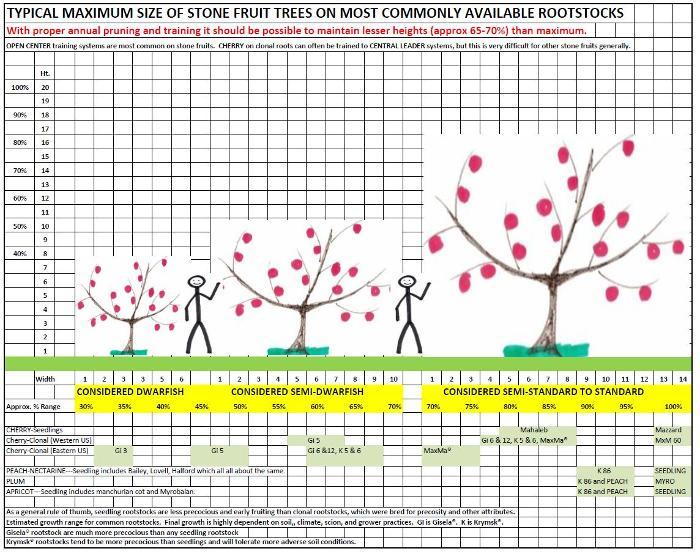RS-Stone Fruit Rootstocks

RS-Stone Fruit Rootstocks
Most soft-fruits are still propagated onto standard, non-dwarfing rootstocks.
PEACH ROOTSTOCKS:
Peaches are almost exclusively available on seedling peach rootstock. Almost all peach rootstocks are suitable for lighter, well drained, sandy-loamy soils. They do not tolerate wet conditions or wet, poorly drained soils. Mounding of planting sites or raised beds created for a better drained soil condition will help prolong tree life and reduce winter injury from late hardening off in the fall. Typical varieties used for seed include Halford, Lovell, Tennessee Natural, and Bailey. There is still some debate whether there are significant hardiness differences between the cultivars, but most growers consider Bailey as being on the hardier end, while Halford may be on the less hardy end of the spectrum. However, if peaches are a significant commercial crop in your area there is little chance of winter injury, it may not matter which rootstock is used. However, if peach production is marginal or there has been a history of frequent winter injury, then the perceived hardier varieties may be a better choice.
There are no significant commercial dwarfing rootstocks for peach or other stone fruits at this time. However, research continues for dwarfing rootstocks, such as the new Krymsk® series, with commercial potential that may be suitable for the commercial grower. Controller 6® is another new somewhat dwarfing rootstock that is starting to be tested by growers. We do not recommend any other rootstock than seedling at this time.
PLUM AND PRUNE ROOTSTOCK:
Myrobalan (Prunus cerasifera) 29C--- An improved selection of the most common myrobalan seedling rootstock used for plums, prunes, and sometimes peaches. Vigorous and not considered a dwarfing rootstock. Resistant to armillaria root rot (oak root fungus) and nematodes. Adaptable to a wide range of soils. Usually well anchored, but somewhat shallow rooted. Prone to suckering. Not used or recommended for commercial peach plantings, normally, unless wetter, poorly drained soil conditions warrant. Common myro seedling is just as suitable a rootstock, however may be slightly more variable as it is a seedling and not a clone.
Seedling peach--- Often used for plums and prunes, since no incompatibility exists. Typically suitable for well drained, sandy soils, but some concern that they may be more short lived than myrobalan. We do not normally recommend peach root for plums and prunes, ,except under very sandy soil conditions where drainage is never a problem.
APRICOT ROOTSTOCK:
The recommended rootstock for apricots is manchurian or seedling apricot root. It is hardy and productive, although apricots are somewhat slow to come into bearing. Full grown, mature trees can reach 30 feet tall after many years, but production usually commences after four or five years on smaller trees. Myrobalan is often also used as there appears to be no compatibility issues.